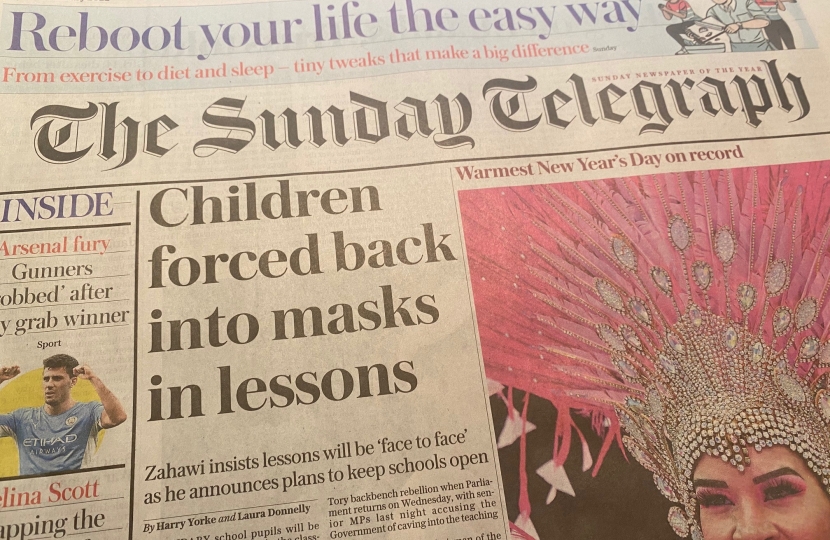
The Prime Minister deserves credit for his recent decisions in respect of Covid.
He has followed the science, but he has taken a wider view of how society and the economy would be impacted by so called “plan C” and, crucially, he has taken the long view. England is not out of step with Scotland and Wales; they’re out of step with us.
They are living in the past, reaching for the same blunt instruments that were used right at the start of the pandemic, before we knew what we were dealing with, and before the vaccine breakthrough.
Boris Johnson has also read the room. Not, as some claim, because he is putting politics over public health (in fact, plenty of MPs, including almost the entire parliamentary Labour Party, would be in favour of more restrictions) but because he is finally sensing a shift in public opinion.
What has caused this shift? Very possibly it is the spectre of another senseless pingdemic - where people with no symptoms or at worst a seasonal sniffle are confined to barracks for a week - that is finally moving the dial.
But even with this hint of change, we’re light years away from learning to live with Covid.
The decision to reduce the self-isolation period from ten to seven days was welcome, but it doesn’t go far enough. In the US and in Germany the isolation period is now just five days. Covid doesn’t behave any differently in New York and Frankfurt, so ministers need to be clear about the advice they are receiving and why our policy is different.
More fundamentally, if we are serious about living with endemic Covid, it is surely time to start rethinking mandatory isolation for those who have tested positive for Covid. In the first year I was public health minister, just over 20,000 people sadly died of flu (despite us having a vaccine) yet it has never been a legal requirement to stay at home if you have flu.
We must also look again at how we handle high Covid case numbers. On Christmas Eve, Jenny Harries, the head of the UK Health Security Agency, said that we will need to consider new restrictions in the context not just of hospitalisations from Covid, but the impact high case numbers could have on “key worker availability”.
Really? That is, yet again, a seismic shift in Government policy - relayed by an official - which has never been discussed by Parliament.
The logic of this argument is presumably that high case rates lead to key workers (by which we really mean NHS staff) catching Covid, and it is therefore necessary to turn once again to non-pharmaceutical interventions to keep people apart and prevent transmission. Yet that implies that the focus is still on case numbers, despite ministers consistently saying that it is hospitalisations, not cases, that should concern us.
The PM needs to distance himself early in the new year from this approach, which looks at the problem from the wrong end of the telescope and fuels suspicion that a zero Covid strategy is alive and well. As we enter this new year, the time has come for us to ask ourselves whether we want a country where basic freedoms and our economy are subject to a Covid case rate test before they’re allowed to operate unfettered.
At the very least, ministers must think long and hard about whether Track and Trace in its current form is really sustainable. According to current guidance, if someone in your household tests positive for Covid, you are strongly advised to test every day - even if you are double or triple vaccinated. Not only is this incompatible with “learning to live with Covid” in any meaningful sense, but there is also a nationwide shortage of both PCRs and lateral flows.
Of course, relaxing the rules around Track and Trace would come with risk attached. And that risk would increase if we went as far as to allow asymptomatic fully vaccinated people to get back to work.
But surely everything is a balance of risk? Is the triple vaccinated patient presenting at A&E with chest pain at greater risk from Covid, or from an understaffed NHS lacking the resources to deal with a potential heart attack?
The PM says 90% of those in ICU are not fully vaccinated, so let’s show that distinction in the daily figures. It would give us a clearer picture of where we are, and encourage more people to get the jab. Let’s also start drawing a firm line between those in hospital with Covid, and those who are there because of it.
All of this matters now more than ever because schools return next week. Headteachers need their staff if they are to open fully, and they need the confidence to push back against the teaching unions.
Anyone who believes this is all too radical should ask themselves whether they really want to stumble on like this indefinitely.
It’s time for the Government to establish a clear framework for living with the virus in 2022 and beyond so that we can all start planning and enjoying our futures.
Steve Brine MP is a former public health minister

